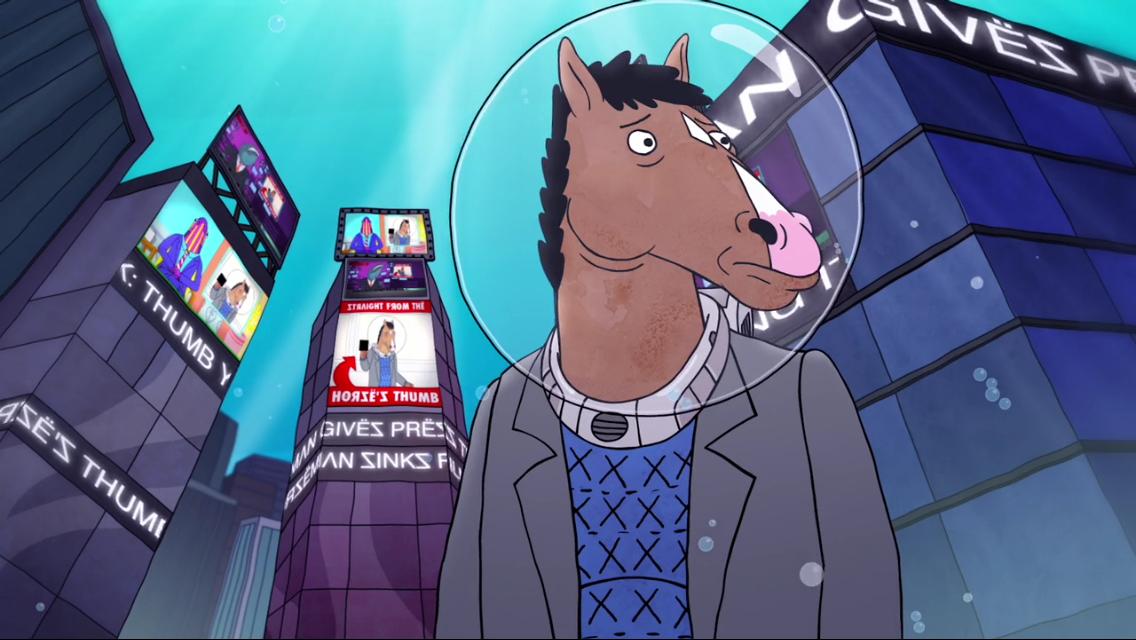By Skyler Manley | gargoyle@flagler.edu
Identifying with a character in a television show is common. Within the Netflix Original Series “Bojack Horseman,” the world the audience and the main character find their identity in the unreal. The unreal world becomes very real the further the show goes on. Bojack Horseman, a washed up 80s sitcom star, suffers through an existential crisis in various points of the show’s plot. He is constantly sent into emotional and existential spirals downward, at times bringing others with him. There is a strange connection shared in this train wreck of a character archetype and myself. Ultimately, it all comes down to insecurity and question of integrity.
The stereotypical “finding yourself” track makes its way through our heads at some point in this strange proto-adulthood timing. Understanding who we are fundamentally isn’t always something that occurs early on. Bojack struggles to find what it is that continues to spiral himself over and over again through phases of self-destruction. A poignant moment at the end of Season 3 was when Todd, a lovable slacker, angrily snaps at Bojack for something he did. It’s clear to the characters around Bojack that his choices play a major role in what makes him destructive.
The strange connection to the character even stems from my inability to realize how important that was until Bojack Horseman did. As a viewer, it felt like I struggled along with Bojack in understanding insecurity. It took a long time for Bojack to understand what was fundamentally wrong with his character. It almost took the viewer just as much time for his deep-seeded flaws to come into view. The flaws that, in fact, provided an explanation for his destructive behavior.

© Netflix 2016
Seeing a character search for answers and lose themselves, while almost taking part in similar mental soul searching in my own life has affected me. Granted, I lack many if not all of Bojack Horseman’s physically destructive qualities. Some of the social destruction that takes place is something that many of us have been through in a time of extreme change.
At one point, questioning his substance as an artist and what he thought he was good at came into play with his fictional role in “Secretariat.” This is supposed to be a satirical take on the classic dramatic sports film. In the show, he struggled to perform that serious role and ultimately was digitally edited out of the film. He still appears, but is replaced with a digitally altered version of himself. The director of the film witnessed Bojack have a sincere acting moment but of course it wasn’t captured.
Another strong link was with his struggle in doubting his talent as an actor and artist. As soon as I learned I was drawn to the arts, writing and theater, which were things I felt confident in, I began to base some of my identity around them. But then when something happens to derail your confidence, it creates a question of worth. This self worth becomes dangerously close to being based on something like a skill.
Self worth has to be deeper than simply something that you do or contribute—which is difficult in society today. It shows in the world of Bojack with Hollywood. You have to have something whether it’s a talent, a particular aesthetic, entertainment or being manipulative to survive the cutthroat world. As an artist, you can’t base your artistic skill on something as superficial as an award. More importantly, as a human being, your worth cannot be based on something so materialistic and superficial.
You have to believe in what you do no matter what the circumstances. It is important to see such a deeply damaged character and a plot that allows an audience to struggle along with that character. This is something that can help connecting with my own inner emotions more digestible. The show helped me understand on a deeper level how damaging extreme insecurity can be. In its own dark, funny way, an animated horse resonates with me on an emotional level.



Be the first to comment on "Soul searching through a cartoon horse"